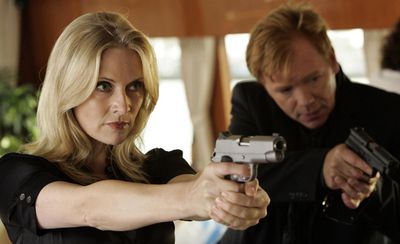It had to happen sooner or later. CSI, the TV show about forensics and crime, has become the center of a court case in Massachusetts.
There, The Supreme Judicial Court has ruled that a man was not denied a fair trial, because a judge questioned jurors about the “CSI effect,” which is the assertion that because more people watch television than go to law school (apparently by a slim margin, anecdotal evidence suggests) , people have unreasonable expectations of prosecutors when it comes to the evidence presented.
The trial judge asked potential jurors whether the state “is never able to prove a case beyond a reasonable doubt unless it presents scientific evidence to corroborate witness testimony.”
Thirty-eight people said “yes,” and were excused.
Nonetheless, the SJC not only appeared to rule the man received a fair trial, but suggested that there is no CSI effect, the Boston Globe reports.
The court said that while anecdotes have circulated and the media has reported on it, there is “little empirical evidence” supporting the theory that jurors who watch forensic science TV shows such as CBS-TV’s popular CSI franchise will hold prosecutors to an unreasonably high standard of proof.
But the court also said some jurisdictions allow judges to ask jurors about their views on forensic or scientific evidence. And the court noted a state appeals court decision upholding a conviction where a similar question was posed to jurors.
The high court said judges are allowed a large degree of discretion in the jury selection process and concluded that the trial judge had not abused his discretion and tilted the case toward the prosecution.
“The questions were tailored to ensure that seated jurors were capable of deciding the case without bias and based on the evidence,” the court said.
In a 2008 paper, Michigan trial judge Donald Shelton revealed his study showed that jurors had expectations for real court evidence based on the TV shows they watched, but they were also better to distinguish good evidence from bad.
For all categories of evidence–both scientific and nonscientific–CSI viewers (those who watch CSI on occasion, often, or regularly) generally had higher expectations than non-CSI viewers (those who never or almost never watch the program). But, it is possible that the CSI viewers may have been better informed jurors than the non-CSI viewers. The CSI viewers had higher expectations about scientific evidence that was more likely to be relevant to a particular crime than did the non-CSI viewers. The CSI viewers also had lower expectations about evidence that was less likely to be relevant to a particular crime than did the non-CSI viewers.
The study also found that jurors were not more likely to acquit a defendant without scientific evidence being presented:
In the “every crime” scenario, CSI viewers were more likely to convict without scientific evidence if eyewitness testimony was available.
In rape cases, CSI viewers were less likely to convict if DNA evidence was not presented.
In both the breaking-and-entering and theft scenarios, CSI viewers were more likely to convict if there was victim or other testimony, but no fingerprint evidence.

